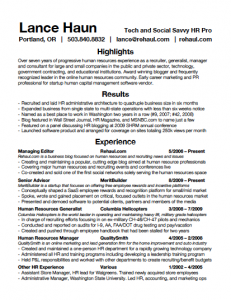Have you ever heard from a person who has consulted the web and books looking for advice on how to put together a great resume only to be more confused than ever? I heard from a person who said everything they read was contradictory.
For example: Should you write a cover letter? What should you say in the cover letter? Should you list an objective? How about dates? How about a functional resume versus a chronological resume?
And then we have the experts; well meaning HR and recruiting professionals, career coaches, or resume writers who try to set these people straight. Do this, do that, and you’ll be set.
But how about the bigger issue: How do you guarantee you’ll get past the resume snob?
I’ve worked with resume snobs and they’re awful. I’m not just talking about people that are picky about spelling issues either (though the “one typo and you’re out” philosophy is post-worthy enough). No, I’m talking about people that were particular about paper type back when we still got mailed resumes.
Why are they so picky?
Formatting was another biggie. If your margins and tabs weren’t perfect, don’t even bother to send that resume in. In addition, don’t ever think of applying without a cover letter, because you would get dropped into the “shred pile” without even a response. And if you wrote your resume in the wrong order (the universally wrong order apparently), that was it.

As an early HR professional, these things terrified me when I wrote my resume. I kept my resume as vanilla as possible, appealing to even the snobbiest of snobs.
The last time I was out looking for a job, I decided to stick it to resume snobs. What was some of the private feedback I received when I posted my resume publicly on my blog?
- I wrote my name too big
- I didn’t include an address
- I listed only one phone number
- Why did I spend so much space on highlights and results?
- I should put my experience up on top
- I didn’t include enough detail
- I included too much detail
- I didn’t include education
- I should have done two pages
- Too much white space
- Too little white space
What really matters in a resume?
All of it was polite, of course. They wanted me to get a job. They wanted to help me (okay, some of them wanted to charge me, too).
I didn’t listen to any of them. I’m not saying that their advice wasn’t important, but to a certain extent, I wanted to make a resume that wasn’t going to fly with everyone who read it.
The document does matter, but the experience the person brings matters more — way more. And that is something that is easy to forget when you’re on your 150th resume (and only your second cup of coffee).
You may be looking for the easy out that a typo, formatting error, or a personal preference you’d rather see, but you do both yourself and your company a disservice when you do that.
